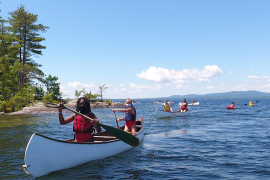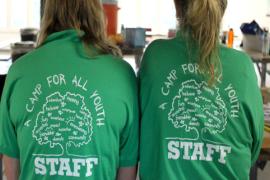"Excuse me," the camp director interrupted, "I just need you to tell us how to respond when a camper or counselor uses a slur like that."
We were in the midst of debriefing a series of movement activities designed to engage a group of counselors to explore their own identities while also introducing themselves to one another. The staff were eagerly listening to our story of a summer camp experience that involved a counselor making a "gay joke," and no one saying or doing anything about the homophobic comment.
Our response to the camp director (and to you): "Stay tuned. We will get to strategies for interrupting inequities at summer camp." First, we want to reflect on our journey and guiding principles for doing this work.
Becoming Interrupters
It’s been our privilege to work with dozens of camps across the country to develop stronger communities with hundreds of staff members who will impact the lives of thousands of campers. While identity development has always been central to our work, it’s come to our attention that this focus isn’t innate when most camps make a commitment to equity.
Much of our work is focused on activities that intentionally engage summer camp staff in identity work. This "archeology of the self" is the process of digging deeply and "peeling back the layers" on one’s life experiences (Sealey-Ruiz, 2021).
An identity-centered approach invites camp staff to think in great depth about the way issues of bias, assumptions, and stereotypes live within them. What views do they hold about diversity and equity? How do their beliefs manifest into actions and attitudes toward others? Camps must constantly examine how these beliefs impact their communities and the treatment of their campers. In order for camps to be inclusive spaces where we all feel that we belong, camp staff must be open to the stories and life experiences their co-counselors and campers bring with them to camp.
As camp professionals, we must be familiar with our own stories — and do the work of self-awareness. If we are not open to our own story, if we do not think deeply about how issues of identity live within us, then we will likely exact harm (Sealey-Ruiz, 2021).
Interrupting Inequities
After an excavation of the self, we introduce common barriers to an inclusive community where folks feel that they belong: privilege, biases, and microaggressions. Our conversation about those barriers centers on the following assertions:
- Privileges are not innately negative; it’s what we do with our privileges that matters most. For example, a veteran staff member or camper returning to camp year after year is a privilege in the sense that those who return to a community have the benefit of knowing how things are done. Rituals and routines are familiar, and our tendency is to gravitate toward those counselors and campers we already know.
- Biases are completely natural — and often helpful. The brain’s amygdala, hippocampus, and prefrontal cortex make up the control panel for bias. The amygdala fires up for our fears, the hippocampus records our memories, and the prefrontal cortex controls our ability to reason and reconsider.
- Microaggressions are often the result of unchecked privilege and unhelpful responses to our implicit biases that result in more insidious, harmful reactions. Over time, these small things we say and do have an eroding effect on the recipient such that their sense of self is damaged.
Over the course of several interactive strategies that create conversation about these obstacles, we ask staff to script short scenarios that describe how barriers to belonging might surface over the summer at their respective camps. Each camp has its own culture, so it is important to allow for this level of individualization. We later workshop the most common themes and topics so that summer staff feel supported and prepared. These discussions can also help lay the foundation for future conversations about structural/systemic changes needed to more meaningfully eradicate inequities at camp.
We have collected hundreds of scenarios and have observed that some challenges to inclusivity are consistent across single gender and co-ed camps. Three common inequities emerge:
- New and returning staff and/or campers
- Gender identity and power dynamics
- Identity-based bullying and name calling
While there is a lot of nuance to how these issues play out in various camp communities, the ask is often the same: “What do we do? What do we say?”
Our belief is that staff are best able to identify the solutions to resolve inequities in their own communities. Camps have often not taken the time to facilitate internal conversations that generate strategies and solutions. To foster this collaborative conversation, camps can use the following framework (adapted from Sealey-Ruiz) as a tool for responding to inequities in their communities:
- What role do I play in perpetuating inequities in the camp community?
- How do I interrupt inequitable practices?
- How do I teach/support the camp community to interrupt these practices in effective ways?
The goal remains the same: to disrupt harmful biases and create spaces where everyone feels included to show up as their authentic selves. This sense of belonging helps us converse with folks who are like us and connect with others across lines of difference. Let's continue the conversation.
Reference
- Sealey-Ruiz, Y. (2021). The critical literacy of race: Toward racial literacy in urban teacher education. Handbook of Urban Education, 281-295, New York, NY: Routledge.
Lance Ozier, EdD, has been on the faculty of the City University of New York since 2009, having also taught courses at Teachers College, Columbia University. Born and raised on a Georgia farm, he now lives in New York, and has taught and worked in Atlanta and NYC classrooms for over 20 years. Lance received a Hedley S. Dimock Award in 2015 and also served on the American Camp Association’s Research Advisory Committee.
Chanika R. Perry, EdD, is the director of education programs at Hands On Atlanta and a board chair at an elementary school designed to bring together refugee, immigrant, and local children. She is also an adjunct professor in the SPA program at Teachers College, Columbia University. Prior to these roles, she was a high school principal in Atlanta. She has been involved in the fields of youth development and education for 23 years, mostly in NYC and Atlanta.
Chanika and Lance have been friends for over 20 years, worked together at Project Morry for over a decade, and continue to enjoy working together as founders of Conversation Forward.


